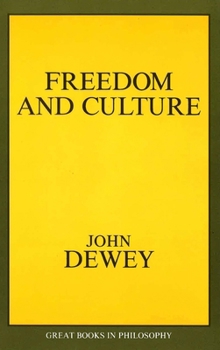Freedom and Culture
Select Format
Select Condition 
Book Overview
The twentieth century has witnessed the blossoming of Western culture: new technology; communications and transportation systems; social, political, educational, agricultural, and medical advances. But with these changes have come the strains and tensions of conflicting interests, desires, and values within the community. John Dewey, one of America's most prolific writers of popular philosophy, believed that humankind could keep a firm hold on its destiny only if the critical intelligence of scientific method and its democratic counterpart were emphasized and promoted. Freedom of inquiry, tolerance of diverse ideas and opinions, cultural pluralism, free speech, and a willingness to cooperate in pursuit of shared values and ideals would be the springboard for social development.
Format:Paperback
Language:English
ISBN:0879755601
ISBN13:9780879755607
Release Date:October 1989
Publisher:Prometheus Books
Length:138 Pages
Weight:0.41 lbs.
Dimensions:0.4" x 5.4" x 8.4"
Customer Reviews
2 ratings
Freedom in Democracy Rejects Absolutism & Ulitmate Ends
Published by Thriftbooks.com User , 20 years ago
John Dewey was an American who supported democracy. In this he leaned towards being a Democrat, rejecting the absolutism found in Republican conservatives. This book was written in 1939 when the scare of totalitarian governments were growing around the world. The idea that many of these people willingly gave up their democratic values and freedom in support of a dictatorial control was the shocker that needed to be addressed which included internally, here at home in the States, the need to address this issue. This book is not outdated, for democracy is a continual day by day experiment not an means to an end as in some ultimate answer as in Marxism and totalitarian states. And now John Dewey will speak for himself: The extreme danger of giving any body of persons power for whose exercise they are not accountable is a commonplace in a democracy. Arbitrary irresponsibility varies in direct ratio to the claim for absoluteness on the part of the principle in behalf of which power is exercised. To sustain the principle against heresy, or counterrevolutionary action, it finally becomes necessary to clothe the human officials that are supposed to represent the principle with the finality of the professed end. Divinity once hedged about kings. p.91 The serious threat to our democracy is not the existence of foreign totalitarian states. It is the existence within our own personal attitudes and within our own institutions of conditions which have given a victory to external authority, discipline, uniformity and dependence upon The Leader in foreign countries. The battlefield is also accordingly here - within ourselves and our institutions." p.49 Harm comes from the fact when a theory is framed in absolute terms, as one which applies to all places and times, instead of under the contemporary conditions and having definite limits. p. 75 While the possessing class is relatively more secure, yet its members are also profoundly unsettled by recurring cyclic depression . . . . . When disorders appear on any considerable scale, the adherence of the middle class to the side of "law and order" is won. Ironically enough, the desire for security which proceeds from the two groups of very different economic status combines to increase readiness to surrender democratic forms of action. pp. 60-61 The moral is not unintelligent glorification of empirical, pluralistic, and pragmatic method. On the contrary, the lesson to be learned is the importance of ideas and of a plurality of ideas employed in experimental activity as working hypotheses. thoughtless empiricism provides opportunity for secret manipulation behind the visible scene. When we assume that we are following common sense policies, in the most honorable sense of commons sense, we may in fact, unless we direct observation of conditions by means of general ideas, be in process of being led around by the nose by agencies purporting to be democratic, but whose activities are subversive of freedom: a generali
A very helpful work.
Published by Thriftbooks.com User , 22 years ago
FREEDOM AND CULTURE is particularly helpful in understanding the different views of freedom and liberty found within the Anglo-American school of thought as compared to the Continental school of thought. Dewey is always an informative read and he explains things very well, though that doesn't mean he would grab the attention of the uninterested. I greatly enjoyed this book, along with Dewey's other works.





